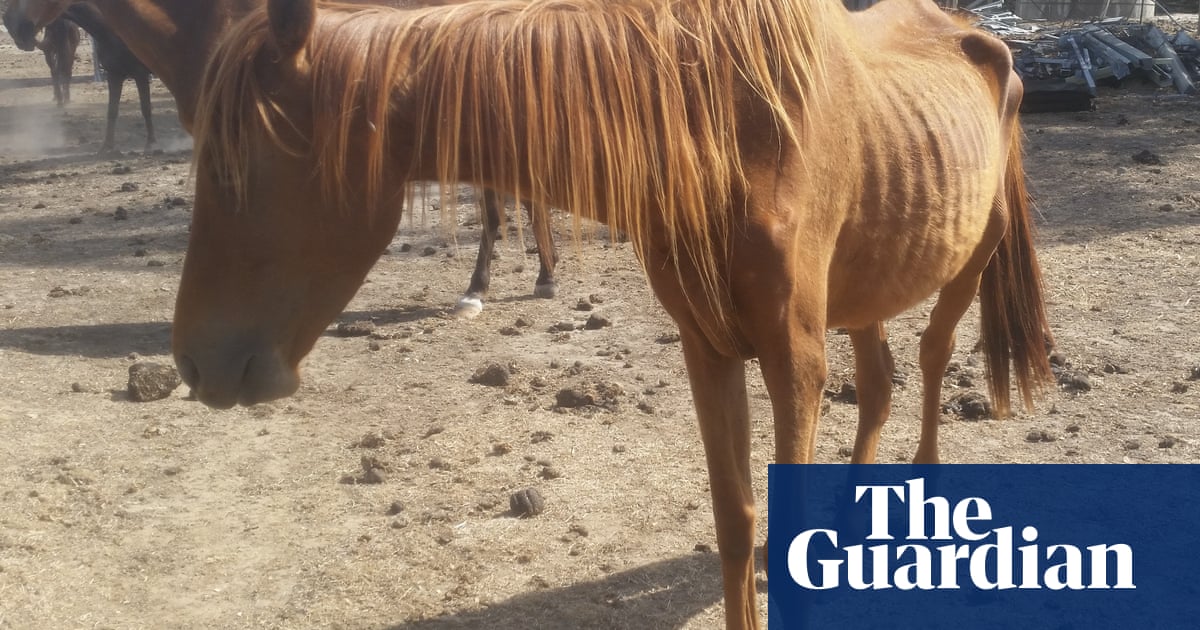The RSPCA has warned it may not be able to investigate animal cruelty complaints against horses unless it receives more funding, as it reports a surge in the number of horses subject to cruelty complaints in the past 12 months.
Asdrought conditions continue in Victoria, RSPCA Victoria said it had received almost 800 animal cruelty reports concerning horses this financial year, a 37% increase on the number of reports received at this point last year.
The number of animals involved had also increased: those 800 reports concern 8,100 horses, a 53% increase in numbers to this time last year.
The organisation currently received $2.3m in annual funding from the Victorian government and had projected operation costs of $10.8m this year.
The RSPCA Victoria chief executive, Liz Walker, said unless it received more funding from the state government the organisation “will likely need to restrict the species of animal we investigate, rehabilitate and rehome, removing horses, poultry, and livestockfrom our scope of work”.
“Our inspectors are the only authorised officers under the Prevention of Cruelty toAnimalsAct who currently enforce and prosecute horse welfare in the state and with horses not currently covered by local laws, without other law enforcement agencies picking it up, neglect and cruelty towards horses will be left unchecked across the state.”
The organisation currently had 180 open cases involving 800 horses. Its chief inspector, Michelle Green, told Guardian Australia that most cases involved underfeeding.
“There are large number of horses in paddocks that are completely stripped bare of any feed due to the sheer number of horses paddocked together, lack of rain, and poor paddock management,” Green said.
Sign up to receive Guardian Australia’s fortnightly Rural Network email newsletter
Aged horses were at particular risk.
“Owners need to be prepared to make decisions on ageing horses – when the condition of the horse does not improve it is important that they are working with their veterinarian and having a plan in place for that horse,” Green said.
Horses fall into a regulatory gap: they are not livestock covered by the department of agriculture or pets covered by local government. There are no limits on numbers, no restrictions on breeding, and no national welfare standards.
Green said inspectors responded to all cruelty complaints but immediate seizure of animals was only permitted by law in a narrow set of circumstances. In most cases, they work with the owner.
“Horse welfare takes quite a while to improve – it’s often a matter of a couple of weeks or a couple of months,” she said.
Green said the drought had driven up hay prices and urged people not to take on more horses than they could afford.
“We see a lot of Facebook groups where people are giving away horses for free, or placing them through online sales, where well-meaning people are tying to help. It’s important that anyone taking on horses understands their animal husbandry requirements, their feed requirements, and what that can cost.
“You have got to keep feeding them even when feed costs go up.”
Sign up toThe Rural Network
Subscribe to Calla Wahlquist's fortnightly update on Australian rural and regional affairs
after newsletter promotion
Racing Victoria has distributed $290,000 in drought relief support funding to racing industry participants, including trainers and acknowledged retrainers – who help racehorses transition into post-racing homes – since March.
It also offers rehoming assistance to all owners of registered thoroughbreds, including those owned by non-racing homes, as part of asafety net programwhich includes covering the cost of humane euthanasia in cases where welfare is at risk.
Cost of euthanasia can be a barrier to some people seeking help, Green said.
Nikki Cook is a Racing Victoria acknowledged retrainer and runs Shory Park – the largest thoroughbred retrainer in the state. She received a one-off payment from Racing Victoria, which covered three weeks’ worth of hay.
“I need it every month,” she said.
Cook was now spending $2,500 a week to feed 40 horses and having to turn away thoroughbreds because the market had slowed. She had started quizzing potential buyers about their hay stores before agreeing to sell to them.
“We have spent $60,000 of my own savings on hay and extra feed costs,” she said. “Round (bales) that previously cost us $70, we are now spending $140. And even if it rains soon, it’s not going to get better – next year’s hay is not going to be better than this year’s. People need to downsize appropriately where they can.”
Appropriate downsizing may mean selling some horses, contacting a rescue, or in the case of older horses humane euthanasia.
“Euthanasia is not the worst option,” she said. “If they have had a good life, let them go at home. If you handball it off to be someone else’s problem it can lead to worse welfare outcomes.”
She urged people to build their feed supplies and make those hard decisions now.
“Don’t leave it too late,” she said. “It’s like having a fire plan – don’t wait until it’s too late and your horse is skinny. You need to be searching for hay every day on marketplace, looking around for old bits of gear to sell to put some money aside for feed. You can still find hay, you just have to pay for it.”
Sign up for the Rural Network email newsletter
